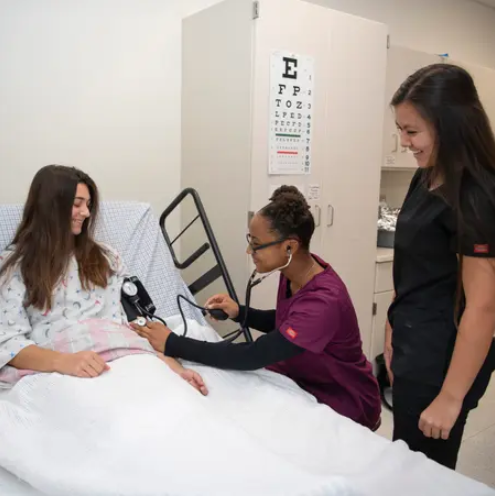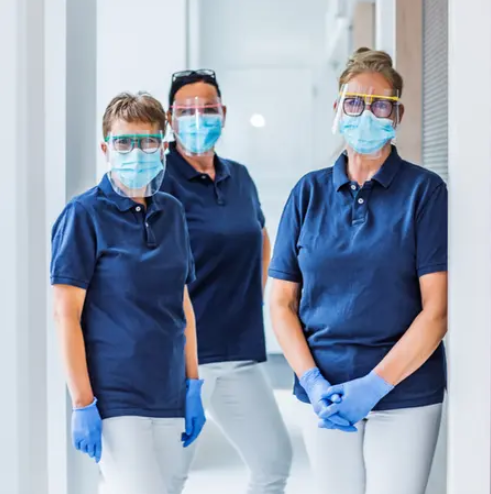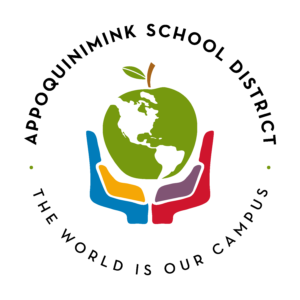
140020
1 Credit
This course provides students with an orientation to the healthcare industry and helps to refine their healthcare-related knowledge and skills. Topics covered usually include (but are not limited to): an overview of healthcare delivery, patient care including assessment of vital signs, body mechanics, and diet, anatomy and physiology, identification and use of medical equipment and supplies, medical terminology, hygiene and disease prevention, first aid and CPR procedures, laboratory procedures, and ethical and legal responsibilities.
141540
1 Credit + 3 College Credits
This course is for sophomores and above and introduces students to careers in healthcare and is a prerequisite to the other Health Science Pathway courses. This course focuses on medical terminology which includes Greek and Latin prefixes, suffixes, roots, abbreviations, names of diseases and surgeries related to hospital services and allied health specialties. In addition, students explore the National Consortium Health for Science Education (NCHSE) Health Science Standards and entry level healthcare skills. Students begin preparation for the NCHSE National Health Science Assessment and develop skills focusing on the language of medicine. This course will be offered as an articulated course with Delaware Technical Community College (BIO100-Medical Terminology) Upon successful completion of the course (75% or better), students will receive three college credits from Delaware Technical Community College.
*Prerequisites: INTRODUCTION TO HEALTH CAREERS
140020
1 Credit
This course is for juniors and above and offers students the opportunity to become effective and efficient healthcare providers as they develop a working knowledge of various healthcare opportunities. As students identify the various areas of Allied Health, they will discuss the potential of education, advancement, employment opportunities, employment sites, and financial rewards. Students will focus on careers in the healthcare field by applying classroom and lab experience to clinical settings as they participate in direct or simulated patient care. Students participate in CPR/First Aid certification through the American Heart Association. This course reinforces and builds upon medical terminology skills learned in the Fundamentals of Health Sciences (FHS) course and is a prerequisite to the AP Anatomy & Physiology I (A&P) course for students in the Allied Health Pathway. Further, this course will be offered as an articulated course with Delaware Technical Community College (HLS100 – Intro to Health Careers). Students participate in CPR/ First Aid certification through the American Heart Association. Upon successful completion of the course (75% or better), students will receive one college credit from Delaware Technical Community College.
*Prerequisites: FUNDAMENTALS OF HEALTH SCIENCES
03910
1 Credit + 3 College Credit
This dual enrollment course, DTCC BIO 120, introduces students to anatomy and physiology of humans including the structure and function of cells, tissues, integumentary, skeletal, muscular, nervous, and endocrine systems. Coordinated laboratory experiments are an integral part of this course. Students learn physiology of each body system, as well as how to investigate common diseases, disorders, and emerging diseases. The prevention of disease, diagnosis, and treatment are addressed. There is an additional $65 lab manual fee due the first week of class.
*Prerequisites: BIOLOGY I - 03051 or 03051H
0305313H
1 Credit + 3 College Credits
This course continues to explore the human body further and looks more in-depth at the cardiovascular, lymphatic, urinary, respiratory, digestive and reproductive systems. Dissections are a required component of this course and are more extensive than Anatomy and Physiology I. Throughout the course, the students will analyze and collaborate to design a course of action for various case studies.
Prerequisite: ANATOMY & PHYSIOLOGY I

FCS9330
1 Credit
Human Growth and Development (HGD) introduces students to human, physical, cognitive, social, and emotional development beginning with conception and ending with early adolescence. Theories supporting current thinking and research on human development are examined, as well as the processes and influences affecting the developing person. Further, students explore challenges to normal growth and development.
141540
1 Credit + 3 College Credits
This course is for sophomores and above and introduces students to careers in healthcare and is a prerequisite to the other Health Science Pathway courses. This course focuses on medical terminology which includes Greek and Latin prefixes, suffixes, roots, abbreviations, names of diseases and surgeries related to hospital services and allied health specialties. In addition, students explore the National Consortium Health for Science Education (NCHSE) Health Science Standards and entry level healthcare skills. Students begin preparation for the NCHSE National Health Science Assessment and develop skills focusing on the language of medicine. This course will be offered as an articulated course with Delaware Technical Community College (BIO100-Medical Terminology) Upon successful completion of the course (75% or better), students will receive three college credits from Delaware Technical Community College.
*Prerequisites: HUMAN GROWTH AND DEVELOPMENT
080530
1 Credit
This course introduces students to population health and examines the interdisciplinary approach to social and behavioral influences. Students learn the history of public and community health and the multi-disciplinary approach to health, which includes examining various organizations and healthcare delivery systems. Students examine complex public health problems and are exposed to major theories of disease etiology and intervention. Additionally, students explore public health issues related to epidemiology, mental health, disabilities, and substance abuse. Students participate in Mental Health First Aid Certification through the National Council for Behavioral Health (NCBH) and continue preparation for the National Health Science Assessment.
*Prerequisites: FUNDAMENTALS OF HEALTH SCIENCES - 141540
080570
1 Credit
This course introduces students to the importance of wellness in relation to the Six Dimensions of Wellness, which include physical, social, intellectual, spiritual, emotional, and occupational wellness. Additionally, students learn basic nutritional requirements for healthy individuals, how exercise affects health, and methods of disease prevention. Students explore factors that predispose individuals to unhealthy behaviors as well as key components of health behavior change. Further, this course is offered as an articulated course through Wilmington University (HLT 321- Personal Wellness). At the completion of the program of study, students complete the National Consortium for Health Science Education (NCHSE) National Health Science Assessment.
*Prerequisites: ESSENTIALS OF PUBLIC & COMMUNITY HEALTH - 080530

Appoquinimink School District
118 S. Sixth Street
Odessa · DE · 19730
WBL@appo.k12.de.us
apposchooldistrict.com